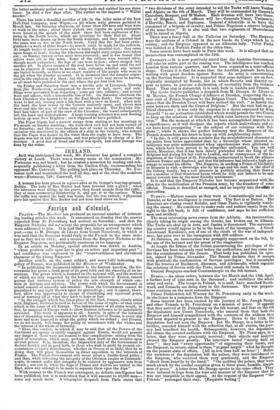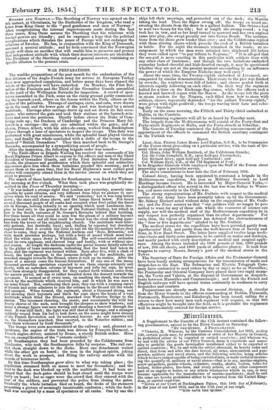Amp utth
FnaNcE.—The Honiteur has produced an unusual number of interest- ing leading articles this week. It announced on Sunday that the answer expected from St. Petersburg had arrived on Saturday; and that the Emperor Nicholas did not accept the proposals for an arrangement which were addressed to him. It is said that two letters arrived by the same post,—one to M. Drouyn de Lhuys from Count Nesselrode, in which it was said that the Russians would reply to the French in the same man- ner as they did in 1812; and a second from the Emperor Nicholas to the Emperor Napoleon, not particularly courteous in its language.
In an article on Monday, special attention was drawn to Austria, "whose position calls upon her to play an active and important part" ; and confidence was expressed in the "trustworthiness and chivalrous character of the young Emperor." Another article, on the same subject, and more fully indicating the policy of France, was published in the Moniteur of Wednesday. " In publishing the documents relative to the Eastern question, the Go- vernment has given a fresh proof of its good faith and the sincerity of its in- tentions. The power which is founded on the national will, and the motives of which are only suggested by the honour and interest of France, cannot pursue that tortuous system of policy the sole strength of which con- sists in intrigue and mystery. The power with which the Government is armed consists of sincerity and candour. Thus the Government cannot be prejudiced by any light thrown upon its proceedings ; and it cannot, there- fore, allow any opportunity to escape of elucidating any equivocal point, and of warning all of what they have to hope or fear.
"In the struggle which has taken place in the East, France, closely allied with England, declared herself in favour of the cause of right—of that cause which is the cause of all Europe. The independence of all states would, in fact, be menaced if Europe were to allow Russian influence to be indefinitely extended. This truth is apparent to all. Austria, in spite of the intimate ties of friendship which connected her with the Court of Russia, is every day more and more disposed to adopt the policy which we defend ; and Prussia, we do not doubt, will frame her policy in accordance with the wishes and the interest of the whole of Germany. "Thus, this conflict, in which it may be said that all the Powers of the Continent are openly or tacitly engaged against Russia, would not present any danger if there were not reasons to fear complications arising from the spirit of revolution, which may, perhaps, show itself on this occasion upon' several points. It is, therefore, the imperative duty of the Government to declare frankly and in good faith, to those who wish to profit by present cir- cumstances to excite disturbances, whether in Greece or in Italy, that by so doing they will place themselves in direct opposition to the interests of France. The French Government will never adopt a double-faced policy ; and thus, while defending the integrity of the Ottoman empire at Constanti- nople, it cannot suffer that integrity to be violated by aggressive acts from Greece ; nor can it, while the flags of France and Austria are united in the East, allow any attempt to be made to separate them upon the Alps."
With respect to the French war contingent, no definite intelligence has been published, but it is understood that it will amount to 40,000 men— some say much more. A telegraphic despatch from Paris states that
I " two divisions of the army intended to aid the Turks will leave Toulon and Algiers on the 6th of March. They will be commanded by Generals Canrobert, Bosquet, and M'Mahon. Each division will have two Gene- rals of Brigade. Those officers will be—Generals Vinoy, Untimarre, d'Herville, Bonet, and Espinasse. General d'Allonville is to have the command of a brigade of cavalry, and Prince Napoleon a reserve brigade of the same force." It is also said that two regiments of Mussulmane will be raised in Algeria.
There was a fancy-ball at the Tuileries on Saturday. The Emperor wore the uniform of a Colonel in the new Garde du Corps which he is raising ; and the Empress appeared as an Albanian lady. Veley Pasba was habited as a Turkish Pasha of the olden time.
Some arrests have been made in Paris this week. It is alleged that an insurrection was contemplated on the 24th.
GERMANY.—It is now positively. stated that the Austrian Government will take an active part in the coming war. The intelligence has reached London from various quarters, and has been repeated in a semi-official shape. Certain it is that for some time the Austrian journals have been writing with great freedom against Russia. An army is concentrating on the Servian frontier. It is suspected that some intrigues are on foot, originally instigated by Russia, but in which Bavaria and Saxony ap- pear as actors, to procure a declaration of neutrality from the German Bund. That step is distasteful, it is said, both to Austria and Prussia. The Gotha Gazette publishes a despatch from M. Drouyn de Lhuys to M. Mercier, the French Charge d'Affaires at Dresden, respecting the re- cent visit of Prince Napoleon to the Belgian Court. The despatch inti- mates that the Dresden Court will have noticed the visit, " as family ties exist between them and the Court of Belgium." But the visit had no po- litical character ; it was only the response to a desire expressed by King Leopold " to see a situation established which would permit the two Courts to keep up the relations of friendship which exist between the two coun- tries." But the moment at which it has been accomplished imparts to it a significance, as it will dissipate the reports which malevolence and er- ror have been propagating " on the subject of our relations with Bel- gium "; while it shows the perfect harmony that the Emperor of the French desires from his heart to keep up with neighbouring states.
" In fine, it will' prove that nowhere has the straightforward character of his policy been better appreciated than by a Sovereign whose elevated in- telligence was quite misunderstood when apprehensions were attributed to him, which have been proved to be altogether unfounded. You are well aware, Monsieur,. that it has been falsely pretended that the King of the Belgians had during his last visit to London, and in consequence of the in- stigations of the Cabinet of St. Petersburg, endeavoured to break the alliance between France and England, and that his influence had induced a high per- sonage to second his efforts. The Emperor, in sending a Prince of his family to Brussels to visit a Sovereign who by his age and his rank is the chief of the Coburg family, has a real pleasure in publicly attesting that there is not a member of that illustrious house whom he does not believe to be ani- mated towards him by the most friendly sentiments."
It is said that the Emperor Nicholas has become acquainted with:the plan for the mobilization of the Prussian army, by the treachery of some official. Prussia is described as enraged, and an inquiry into the athir is proceeding.
TURICTIY.—Matters remain as they were at Constantinople and on the Danube, so far as intelligence is concerned. The fleet is at Beicos. The Russians are dosing round Kalafat, and Omar Pasha is vigilantly watch, ing the enemy. He continues to make rude and sudden onsets from the right to the left bank, is full of confidence, and says he has sufficient men and artillery.
The most interesting news comes from the Adriatic. An insurrection, clearly taking its origin among the Greeks, has broken out in Albania. The Turks are shut up in Arta, and Janina is threatened. The surround- ing country would appear to be in the hands of the insurgents. A Greek Lieutenant Karakiasis' son of one of the chiefs of the war of independ- ence, has gone over to the insurgents with 300 soldiers.
At Salonica, an insurrection was promptly suppressed on the 9th, by the use of the bayonet and the arrest of the ringleaders. At length the firman of the Sultan guaranteeing the privileges of the Servians has been solemnly read before the authorities, and has come un- der the consideration of the Senate. That body has published its opin- ion, signed by Prince Alexander. The Senate declares that it accepts with gratitude the confirmation of Servian privileges ; but it maintains that the treaties of Bucharest, Akerman, anjl Adrianople, which regulate the relations of Servia with the Porte, mill, still remain in force. General Burgoyne reached Constantinople on the 8th instant.
Russia.—An ukase orders, between the 1st March and•the 16th April, a further levy of nine men in the thousand ; and mobilizes the whole army and navy. The troops in Poland, it is said, have marched South- ward, and Cossacks are doing duty in the fortresses. The war prepara- tions continue on the most extensive scale.
Prince Paskiewitch left Warsaw for St. Petersburg early in the week, in obedience to a summons from the Emperor.
Some interest has been excited by the journey of Mr. Joseph Sturge and other Friends to St. Petersburg on a mission of peace. It appears that they arrived at St. Petersburg on the 4th instant, and that on the 6th the deputation saw Count Nesselrode, who assured them that both the Emperor and himself sympathized with the contents of the address they had been deputed to present to the Emperor. Down to the 11th, the deputation had not seen the Emperor : but Mr. Sturge, in a letter to his brother, consoled himself with the reflection that, at all events, the jour- ney had benefited his health. Subsequently, however, the deputation did obtain the coveted audience with the Emperor. Mr. Pease says, in a letter, that they were graciously received ; their objects and motives pleased the Emperor greatly. The interview lasted "nearly half an hour " ; they had "every opportunity" of expressing their views, and the Emperor, in return, stated to them "at great length" what he thought on the present state of affairs. [All in less then half an hour! ] Before the members of the deputation -left the palace, they were introduced to the Empress, who received them very graciously, and the Emperor "shook them heartily by the hand." "On quitting the palace, they were much struck by the cordial reception given to three plain, humble, simple men of peace." A letter from Mr. Sturge speaks to the same effect. They were induced to hope from the tone and manner of the Emperor that he was not insensible to their appeal. At the request of the Emperor " the Friends" prolonged their stay. [Exquisite fooling 1.] SWEDEN AND NORWAY.—The Storthing of Norway was opened on the 8th instant, at Christiania, by the Statholder of the kingdom, who read a letter from King Oscar to the "good gentlemen and men of Norway!' After recapitulating the internal improvements made during the last three years, King Oscar assures the Storthing that his relations with foreign powers are friendly ; and he expresses a hope that the political complications which threaten the peace of Europe will not endanger the relations of Sweden. He has, in conjunction with the King of Denmark, assumed a neutral attitude ; and he feels convinced that the Norwegian people will shun no sacrifice that will enable him to preserve and protect that independent attitude with which their dearest interests are identified. The President of the Storthing returned a general answer, containing no specific allusion to the present crisis.



























 Previous page
Previous page